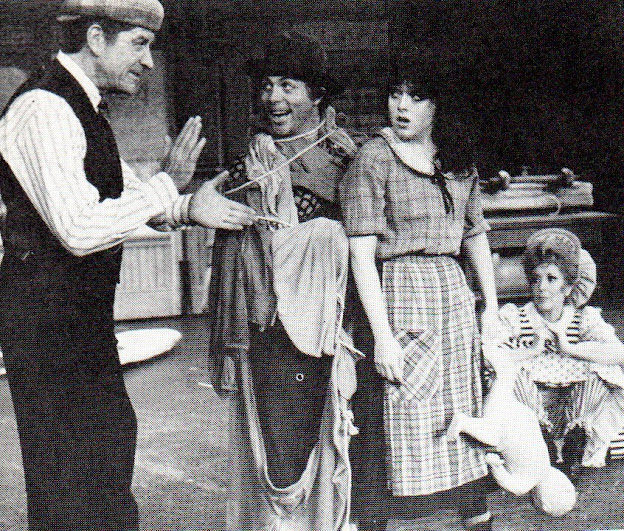 |
| Robert Preston, Christopher Murney, Bernadette Peters, Lisa Kirk. |
MACK AND MABEL [Musical/Alcoholism/Biographical/Drugs/Films/Hollywood/Period/Romance] B: Michael Stewart; M/LY: Jerry Herman; SC: an idea by Leonard Spigelgass; D/CH: Gower Champion; S: Robin Wagner; C: Patricia Zipprodt; L: Tharon Musser; P: David Merrick; T: Majestic Theatre; 10/6/74-11/30/74 (65)
 |
| Robert Preston, Bernadette Peters, Igors Gavon, Christopher Murney, Jerry Dodge, and company. |
All the critics found much to extol in this lavish,
expensive musical, but all had to admit that it was a failure. For most, the
crucial weakness was in Michael Stewarts’s lame book, which was unable to make
its central characters either convincing or compelling. This, of course,
despite a score by Jerry Herman and sterling stars Robert Preston and
Bernadette Peters.
The “cliché story line,” as Jack Kroll put it, concerns the
1911 discovery by silent movie director Mack Sennett (Preston) of Brooklyn
delicatessen waitress Mabel Normand (Peters)—the real life Normand was a
well-paid model—whom he promptly turns into the popular star of his silent
movie comedies. Normand’s one-sided love affair with the egocentric, monomaniacal
director, his eventual-but-too-late revelation of his feelings for her, her
fall into scandal, alcoholism, and drug addiction, and her ultimate death at 34
are the substance of the melodramatic plot. It is told largely in flashback by
Sennett as he stands in a deserted studio in 1933, his career nothing but a
memory.
 |
| James Mitchell, Bernadette Peters. |
Herman’s score had “tunes only a backer would hum,” wrote Howard Kissell. Too much of it sounded familiar, with one big number, “When Mabel Comes in the Room,” seeming a veritable copy of the title song of Hello, Dolly!, an earlier Herman-Gower Champion collaboration.
There was disagreement on the
quality of the latter’s dance and directing contributions. His staging, making
ample use of Robin Wagner’s brilliant scenery, was elaborate, including
Keystone Kops sequences, a Sennett bathing beauty number, Busby Berkeley-like
tap work, custard pie routines, unusual entrances down fire poles and a
corkscrew slide, and the use of a camera boon on which Preston rode out over
the heads of the audience in the orchestra.
Champion threw out “more
directorial and choreographic ideas per minute than most other directors per
entire production,” declaimed John Simon. Others, however, complained of the show’s
lack of consistently effective and original dance routines. Champion’s
inability to capture the techniques on stage that Sennett had achieved on
screen were also noted, especially in view of the film clips expertly incorporated into the proceedings.
 |
| Robert Preston and chorus girls. |
Barely a soul quarreled about
the stars, Preston and Peters, but all were displeased by the inadequacy of
their roles. Preston’s professionalism got him through with flying colors, and
Peters’s singing, dancing, and acting, matched by her personal attractiveness,
did much to polish her already gleaming reputation. Lisa Kirk and James Mitchell were highly appreciated supporting
players.
Jerry Herman's work, though, was not recognized, sorely disappointing him. He blamed the show's early demise on a lack of support from producer David Merrick. But, given the feelings the show still generates among its strong fan base, perhaps we should add these words on the show’s failure from Martin Gottfried’s huge tome, Broadway Musicals. He writes;
it tried out in Los Angeles, where it was considered a show with problems but basically sound. By the time Mack and Mabel arrived in New York, it had been ruined. Buried in the rubble was a prime Herman score—one that would have become a classic had the show been a hit. How many lovers of musical theater have missed the chance to thrill over the sheer Broadway rhythm and the heart-stopping exuberance of this show’s “Movies Were Movies”? How many have never heard the rhapsodic stage-scale ballad, “I Won’t Send Roses”? Mack and Mabel proved a painful example of a newly developed problem: Intensified economic pressure and the focus of a national spotlight were making a musical’s tryout and tune-up process too tense to serve its function.